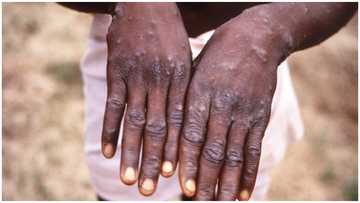Monkeypox Virus: GIDC Says Fears Over 5 Confirmed Cases in Ghana Not Legitimate
- Acting Director at the Ghana Infectious Disease Centre (GIDC), Dr Joseph Oliver-commey, says fears over the outbreak of monkeypox in Ghana are not legitimate
- The Infectious Disease Consultant said the nation has the capacity of controlling and preventing the virus from blowing out of proportion
- Five cases of the monkeypox virus were confirmed by the Ghana Health Service (GHS) on Wednesday, June 8
PAY ATTENTION: Update YEN.com.gh App for free: The old version will be disabled soon
Acting Director at the Ghana Infectious Disease Centre (GIDC), Dr Joseph Oliver-commey, has minimised fears following an outbreak of the monkeypox virus in the country.
Five cases of the monkeypox virus were confirmed by the Ghana Health Service (GHS) on Wednesday, June 8, quickly sparking fears in a section of the public.
''So far, since the outbreak, we've tested 12 suspected cases in Ghana since May 24, 2022. We have confirmed five cases in three regions; Eastern, Bono, and Greater Accra. No deaths have occurred among the cases,'' said the Director-General of the Service, Dr Patrick Kuma-Aboagye, at a press briefing, Joy News reported.

Source: UGC
Public fears not legitimate
In an exclusive interview with YEN.com.gh on the heightened panic, Dr Oliver-commey said public fears of the virus are not legitimate.
PAY ATTENTION: Follow us on Instagram - get the most important news directly in your favourite app!
''Monkeypox is endemic in Ghana, so seeing it in the country is not out of place. The fears are not legitimate.''
''Unlike Covid, monkeypox spreads through contact with secretions from the rash or pox, and the country has the capacity of controlling and preventing it from blowing out of proportion.''
While there are vaccines available for the treatment of the disease, the cases have not reached the stage to call for it.
Known prevention measures
Dr Oliver-commey, who doubles as an Infectious Disease Consultant, urged the public to continue with COVID-19 prevention measures to stem the spread of the monkeypox virus and stay safe.
''Persons treating infected persons must wear a mask and protective clothing, wash hands and clothes regularly, and sanitise frequently to prevent or reduce person-to-person transmissions.
''Hunters must also treat their game or meat well to prevent animal to person infections,'' he told YEN.com.gh.
Meanwhile, monkeypox is a rare but potentially deadly viral disease that can be transmitted from person to person through direct contact with body fluid or monkeypox lesions.
Symptoms can be very similar to those experienced by smallpox patients and although it's less clinically severe, it's visually dramatic.
Infected persons may experience raised pustules and fever in the most severe cases that can last from two to four weeks.
PAY ATTENTION: check out news exactly for YOU ➡️ find "Recommended for you" block and enjoy!
Source: YEN.com.gh



